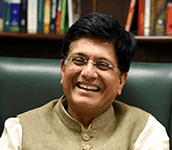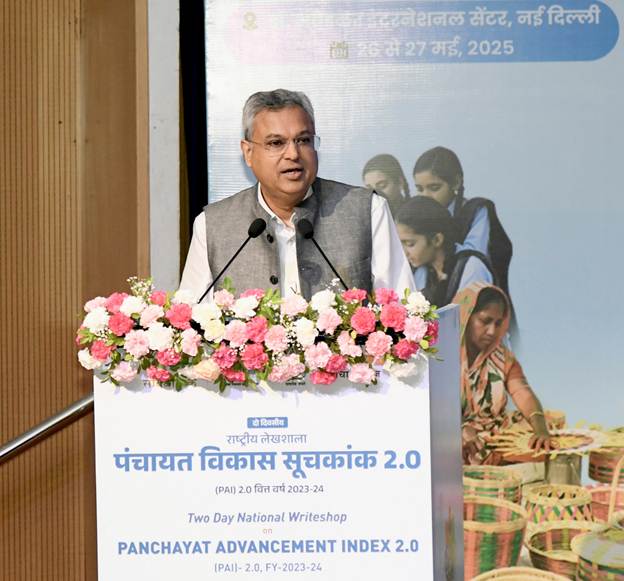MAY 26: The two-day National Writeshop for Panchayat Advancement Index (PAI) Version 2.0 for FY 2023–24 kicked off today at the Dr. Ambedkar International Centre, New Delhi, with over 250 participants from 32 States and UTs. The event was inaugurated by Shri Vivek Bharadwaj, Secretary, Ministry of Panchayati Raj; Shri Saurabh Garg, Secretary, Ministry of Statistics and Programme Implementation (MoSPI); Shri Sushil Kumar Lohani, Additional Secretary, Ministry of Panchayati Raj; and Shri Rajib Kumar Sen, Senior Advisor, NITI Aayog. Alongside the launch of the new PAI 2.0 portal (https://pai.gov.in), the Local Indicator Framework booklet for 2023–24 and its Standard Operating Procedure were released.
In his opening address, Shri Vivek Bharadwaj stressed that PAI 2.0 is more than a data‐collection tool—it institutionalizes transparency, accountability, and performance-based governance at the Panchayat level. Citing the Prime Minister’s vision for Aspirational Districts and Blocks, he urged Panchayat functionaries to enter precise data, noting that “when we record accurate data, we do not merely count; we contribute to the nation’s transformation.” He also encouraged all Gram Panchayats to prominently display their PAI scorecards in GP Bhawans to foster public participation and local accountability.
Shri Saurabh Garg lauded the Ministry of Panchayati Raj for aligning PAI 2.0 with the Sustainable Development Goals. He pointed out that India’s SDG data coverage has jumped from 55% to nearly 95% in five years, and described PAI’s ethos as “measure what we treasure, and treasure what we measure.” He emphasized that standardized, harmonized, and visualized data will underpin inclusive, outcome-oriented governance and drive India toward its Viksit Bharat goals through a bottom-up “Sabka Prayas” approach.
Shri Rajib Kumar Sen highlighted PAI 2.0’s role in linking grassroots efforts with national and global commitments, complementing the SDG India Index and bolstering India’s readiness for future Voluntary National Reviews at international forums.
Shri Sushil Kumar Lohani observed that the writeshop underscores the government’s dedication to data-backed planning and monitoring. He noted that PAI 2.0 equips Panchayats with tools to self-assess progress, identify gaps, and plan strategically, fostering healthy competition and continuous improvement.
PAI is a multi-dimensional framework tracking performance across nine themes—ranging from poverty alleviation and health to infrastructure, governance, and women’s empowerment—covering over 2.5 lakh Gram Panchayats. Version 2.0 refines the original 29-state baseline by reducing reporting burdens, enhancing data quality, and streamlining indicators aligned with the Localization of SDGs.
The second day will feature state and UT presentations on PAI 1.0 experiences and strategies for leveraging PAI 2.0 to strengthen grassroots planning. Live demos, technical walkthroughs, and hands-on portal exercises will round out this collaborative effort to propel India’s Panchayats toward evidence-based, equitable development.


















